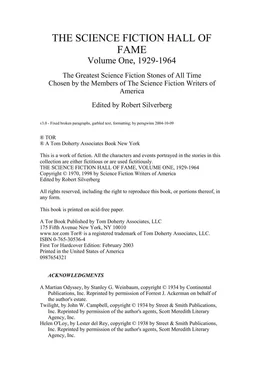I entered the machine, and instantly half a dozen more beams sprang into being; there was a slight suggestion of a quiver, and a queer strain ran through my body. I understood in an instant, for the machine was resting on gravity nullifiers. That had been my hope when I worked on the space fields I discovered after the release.
But they had had it for millions of years before they built that perfect deathless machine. My weight entering it had forced it to readjust itself and simultaneously to prepare for operation. Within, an artificial gravity equal to that of Earth had gripped me, and the neutral zone between the outside and the interior had caused the strain.
The machine was ready. It was fully fueled, too. You see they were equipped to tell automatically their wants and needs. They were almost living things, every one. A caretaker machine kept them supplied, adjusted, even repaired them when need be, and when possible. If it was not, I learned later, they were carried away in a service truck that came automatically; replaced by an exactly similar machine; and carried to the shops where they were made, and automatic machines made them over.
The machine waited patiently for me to start. The controls were simple, obvious.
There was a lever at the left that you pushed forward to move forward, pulled back to go back. On the right a horizontal, pivoted bar. If you swung it left, the ship spun left; if right, the snip spun right. If tipped up, the ship followed it, and likewise for all motions other than backward and forward. Raising it bodily raised the snip, as depressing it depressed the ship.
I lifted it slightly, a needle moved a bit on a gauge comfortably before my eyes as I lay there, and the floor dropped beneath me. I pulled the other control back, and the ship gathered speed as it moved gently out into the open. Releasing both controls into neutral, the machine continued till it stopped at the same elevation, the motion absorbed by air friction. I turned it about, and another dial before my eyes moved, showing my position. I could not read it, though. The map did not move, as I had hoped it would. So I started toward what I felt was west.
I could feel no acceleration in that marvelous machine. The ground simply began leaping backward, and in a moment the city was gone. The map unrolled rapidly beneath me now, and I saw that I was moving south of west. I turned northward slightly, and watched the compass. Soon I understood that, too, and the ship sped on.
I had become too interested in the map and the compass, for suddenly there was a sharp buzz and, without my volition, the machine rose and swung to the north. There was a mountain ahead of me; I had not seen, but the ship had.
I noticed then what I should have seen before—two little knobs that could move the map. I started to move them and heard a sharp clicking, and the pace of the ship began decreasing. A moment and it had steadied at a considerably lower speed, the machine swinging to a new course. I tried to right it, but to my amazement the controls did not affect it.
It was the map, you see. It would either follow the course, or the course would follow it. I had moved it and the machine had taken over control of its own accord.
There was a little button I could have pushed—but I didn't know. I couldn't control the ship until it finally came to rest and lowered itself to a stop six inches from the ground in the center of what must have been the ruins of a great city. Sacramento, probably.
I understood now, so I adjusted the map for San Frisco, and the ship went on at once. It steered itself around a mass of broken stone, turned back to its course, and headed on, a bullet-shaped, self-controlled dart.
It didn't descend when it reached San Frisco. It simply hung in the air and sounded a soft musical hum. Twice. Then it waited. I waited, too, and looked down.
There were people here. I saw the humans of that age for the first time. They were little men—bewildered—dwarfed, with heads disproportionately large. But not extremely so.
Their eyes impressed me most. They were huge, and when they looked at me there was a power in them that seemed sleeping, but too deeply to be roused.
I took the manual controls then and landed. And no sooner had I got out, than the ship rose automatically and started off by itself. They had automatic parking devices.
The ship had gone to a public hangar, the nearest, where it would be automatically serviced and cared for. There was a little call set I should have taken with me when I got out. Then I could have pressed a button and called it to me—wherever I was in that city.
The people about me began talking—singing almost—among themselves. Others were coming up leisurely. Men and women—but there seemed no old and few young.
What few young there were, were treated almost with respect, carefully taken care of lest a careless footstep on their toes or a careless step knock them down.
There was reason, you see. They lived a tremendous time. Some lived as long as three thousand years. Then—they simply died. They didn't grow old, and it never had been learned why people died as they did. The heart stopped, the brain ceased thought—and they died. But the young children, children not yet mature, were treated with the utmost care. But one child was born in the course of a month in that city of one hundred thousand people. The human race was growing sterile.
And I have told you that they were lonely? Their loneliness was beyond hope.
For, you see, as man strode toward maturity, he destroyed all forms of life that menaced him. Disease. Insects. Then the last of the insects, and finally the last of the man-eating animals.
The balance of nature was destroyed then, so they had to go on. It was like the machines. They started them—and now they can't stop. They started destroying life—
and now it wouldn't stop. So they had to destroy weeds of all sorts, then many formerly harmless plants. Then the herbivora, too, the deer and the antelope and the rabbit and the horse. They were a menace, they attacked man's machine-tended crops.
Man was still eating natural foods.
You can understand. The thing was beyond their control. In the end they killed off the denizens of the sea, also, in self-defense. Without the many creatures that had kept them in check, they were swarming beyond bounds. And the time had come when synthetic foods replaced natural. The air was purified of all life about two and a half million years after our day, all microscopic life.
That meant that the water, too, must be purified. It was—and then came the end of life in the ocean. There were minute organisms that lived on bacterial forms, and tiny fish that lived on the minute organisms, and small fish that lived on the tiny fish, and big fish that lived on the small fish—and the beginning of the chain was gone. The sea was devoid of life in a generation. That meant about one thousand and five hundred years to them. Even the sea plants had gone.
And on all Earth there was only man and the organisms he had protected —the plants he wanted for decoration, and certain ultra-hygienic pets, as long-lived as their masters. Dogs. They must have been remarkable animals. Man was reaching his maturity then, and his animal friend, the friend that had followed him through a thousand millenniums to your day and mine, and another four thousand millenniums to the day of man's early maturity, had grown in intelligence. In an ancient museum—
a wonderful place, for they had, perfectly preserved, the body of a great leader of mankind who had died five and a half million years before I saw him—in that museum, deserted then, I saw one of those canines. His skull was nearly as large as mine. They had simple ground machines that dogs could be trained to drive, and they held races in which the dogs drove those machines.
Читать дальше












